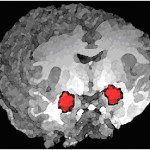
Published today in the Proceedings of the National Academy of Sciences, the study finds that treatment of maternal depression with serotonin reuptake inhibitors(SRIs) can accelerate babies’ ability to attune to the sounds and sights of their native language, while untreated maternal depression can prolong the period of tuning. Continue reading









![Par Hendrike 11:08, 3 May 2006 (UTC) (Travail personnel) [GFDL (www.gnu.org/copyleft/fdl.html) ou CC-BY-SA-3.0 (www.creativecommons.org/licenses/by-sa/3.0/)], via Wikimedia Commons Par Hendrike 11:08, 3 May 2006 (UTC) (Travail personnel) [GFDL (www.gnu.org/copyleft/fdl.html) ou CC-BY-SA-3.0 (www.creativecommons.org/licenses/by-sa/3.0/)], via Wikimedia Commons](http://upload.wikimedia.org/wikipedia/commons/thumb/d/dc/Depression.jpg/100px-Depression.jpg?uselang=fr)
